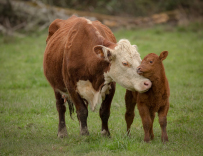Signs your horse might need a treatment:
Horses did not evolve specifically to carry the weight of riders on their backs, and modern competition places even more strain on their skeletal structure. McTimoney practitioners rely on the owner's observations and the veterinary surgeon's subsequent referrals. Indications in animals vary and most owners will recognise when their animal is in pain, or showing signs of distress.
Your horse will generally let you know it is feeling discomfort when ridden especially if the problem is painful and comes on suddenly. These acute injuries can be the result of a one off event/accident i.e. a slip, fall or getting cast. The horse may also have a longstanding issue which it has compensated for over a period of time by adjusting the way it moves. This chronic injury will have built up over a period of days, weeks or months. Examples of this may be due to conformational faults, ill-fitting tack, rider imbalances or dental problems.
When to seek help?
- Uncharacteristic changes in behaviour or temperament- such as a loss of interest in work, lethargy or grumpiness
- Uneven or irregular action
- Sore or cold back
- Uneven wear of shoes or hooves caused by toe dragging or scuffing
- Asymmetery, such as stiffness on one rein, or disunited canter. You may also notice them tilting their head
- Unexplained resistances , such as rearing, refusing at jumps, bucking
- Uneven muscle development
- Inability to stand square
- Deterioration in performance - such as a reduced quality of paces or the ability to extend/collect the stride. The horse may also rush jumps, knock them down or refuse to jump
- Hollowing of the back and the inability or reluctance to work on the bit
Signs your dog might need a treatment:
Dogs have extremely flexible spines, and whilst this allows them to run, jump and curl up tightly in their beds, these flexible spines can make them susceptible to injury. Particular breeds and working dogs can suffer injury due to the nature of their work. For example greyhounds are at risk of injury from running on a tight track often in one direction, long backed and short legged breeds are also susceptible to injury. Even your pet dog can suffer skeletal misalignments which can be caused by obesity, pulling on the lead or overexertion especially when playing with toys such as a frisbees. Just as with horses canine injury can be a result of a one off event such as a trauma like a traffic accident, fight or fall or a result of longstanding compensation.
Symptoms that your dog might show include:
- Crying out when getting up
- Difficulty climbing stairs/ jumping into cars
- Showing discomfort when stroked along their backs or when being groomed
- Reluctance to exercise
- Reduced athletic performance
- Stiffness or pain following exercise
- Uneven/abnormal gait
- Unsymmetrical muscle development
- Inability to cope with slippery surfaces
- Behavioural changes
- Change of stance during urination and defecation
Other Animals:
McTimoney is a very verstile treatment and has been used to treat a variety of animals.
Sheep, goats, pigs, rabbits and even birds have also been treated successfully.



